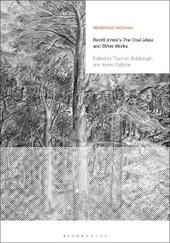
|
David Jones's The Grail Mass and Other Works
Paperback / softback
Main Details
Description
Drawing on new archival discoveries, this book presents an authoritative reconstruction of David Jones's The Grail Mass, the unfinished and unpublished project from which came both his masterpiece The Anathemata - a work described by W.H. Auden as 'one of the most important poems of our times' - and The Sleeping Lord and other fragments, his final collection. With detailed commentary on the development and reconstruction of the text, this edition provides a full picture of Jones's literary endeavours over the second half of his life and further establishes his status as a major figure in the first wave of British modernist writers alongside T.S. Eliot and James Joyce. In addition to the text of The Grail Mass, this edition includes a number of unpublished fragments by Jones that emerged from this larger project, complete with textual commentaries.
Author Biography
David Jones (1895-1974) was a painter and poet increasingly recognized as one of the most important and original voices in British modernism. His poem In Parenthesis was described by T. S. Eliot as "a work of genius" and by Stephen Spender as "the most monumental work of poetic genius to come out of World War I" and his many admirers included W. H. Auden, Herbert Read, and W. B. Yeats. Thomas Goldpaugh, Professor Emeritus, has written extensively on the David Jones Papers at the National Library of Wales and taught for thirty years at Marist College, Poughkeepsie, New York. Jamie Callison is Associate Professor of British and American Literature at Nord University, Norway. He has published widely on modernism and religious culture, T.S. Eliot, and David Jones in journals such as 'Literature and Theology', 'Modernist Cultures', and 'ELH'. He is the co-editor of a collection of essays on David Jones's work entitled: 'David Jones: A Christian Modernist? New Approaches to his Art, Poetry, and Cultural Theory' (2017).
ReviewsAn indispensable addition to the Jones corpus. It is also a deeply impressive textual achievement, and a brilliantly realized and instructive engagement with a rich and complex literary archive ... The fullness of Jones's vision on the page is honoured, and poetic practices which might seem esoteric are validated and released for the reader's appreciation ... [Goldpaugh and Callison's] curiosity and authority as editors shines through with the same force whether they are describing Jones's use of pencil, ink or biro, or revisiting the ambiguous and provocative issue of his political attitudes. * Review of English Studies * The editors' [work is] devoted, skilled, and erudite ... The reconstruction of The Grail Mass does read as a coherent and convincing text, from Mass opening to the close of the soldiers' watch on the wall. This is a tribute to the literary, as well as the editorial craft of Goldpaugh and Callison ... Another joy of this book is the opportunity to read and compare four versions of the 'Mass opening' (one in The Grail Mass, three in the 'Other Works'). * Literature & Theology * This volume will appeal to a variety of audiences: modernists, theologists, and Welsh literary scholars ... It is a substantial, alternative volume to The Roman Quarry, advancing our understanding of Jones's work in significant ways. * Modern Language Review *
|